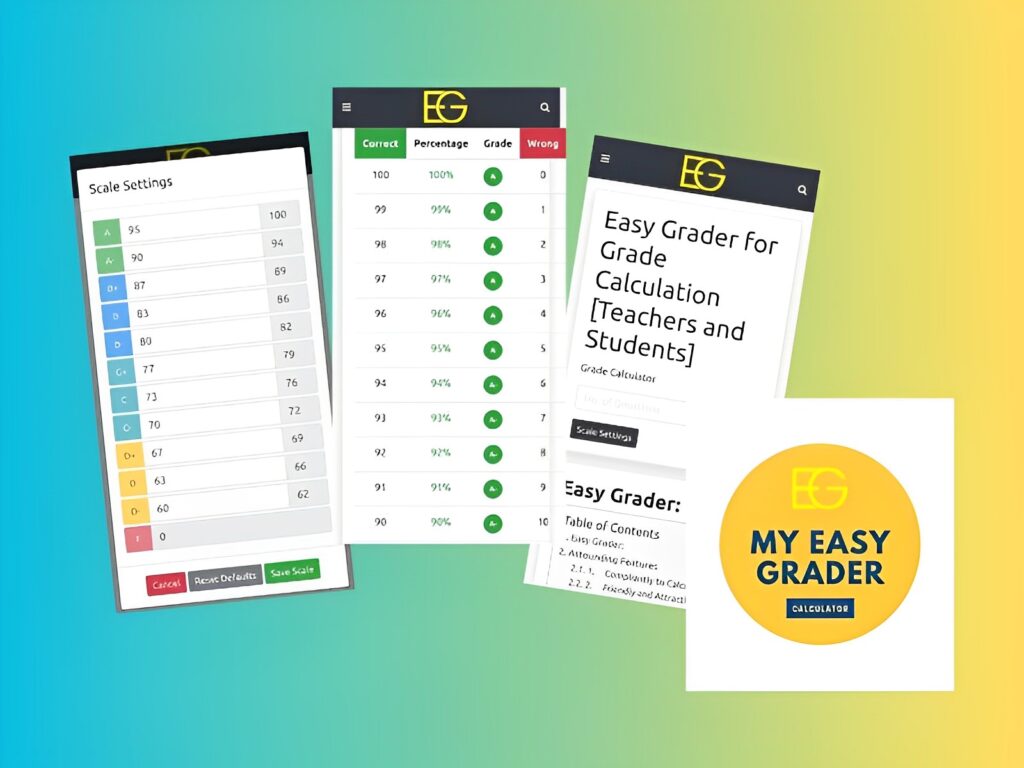Introducing the My Easy Grader Calculator for Solar System Projects—your ultimate companion for effortless and equitable evaluation of celestial projects! Tailored for educators and students, this innovative tool revolutionizes the assessment process for solar system projects, ensuring fairness and accuracy.
Say goodbye to subjective grading and hello to consistency. With the My Easy Grader Calculator, assessing solar system projects becomes a breeze. Whether evaluating models, presentations, or research papers, simply input key criteria such as accuracy, creativity, depth of information, and presentation quality. The calculator also employs advanced algorithms to objectively analyze each project, generating a comprehensive grade that considers various dimensions of astronomical understanding.
Elevate your teaching with unbiased evaluations, or enhance your learning by gaining insight into your project’s strengths and areas for improvement. The My Easy Grader Calculator is set to transform how we evaluate celestial endeavors. So embrace precision, streamline your assessment process, and unlock the universe of potential within solar system projects with this indispensable tool.
Explanation of the Importance of Solar System Projects

Solar system projects are hugely important. They help us understand our universe better. By studying planets, moons, and asteroids, scientists can collect data and find out more about our planet. This data is essential for astronomy, astrophysics, and aerospace engineering.
Exploring solar system projects lets us research planet formation, analyze atmospheres, and look for possible living conditions. Examining the composition and features of planets tells us how the solar system was formed over billions of years. This also helps us understand our place in the universe and makes us want to explore more.
These projects also advance technology. They require advanced instruments and spacecraft. This helps us develop better materials, robots, propulsion systems, and communication technologies.
Solar system projects involve international space agencies. They share resources, knowledge, and data. This encourages global cooperation, cross-cultural understanding, and diplomacy.
Notable recent projects include NASA’s Voyager missions. These gave us insight into Jupiter and Saturn. The spacecraft is still sending data after decades.
Exploring solar system projects teaches us more about space. This helps us appreciate our planet, as well as the cosmic wonders beyond it. So let’s keep exploring and learning, with curiosity and science!
Overview of the Easy Grader Calculator
The Easy Grader Calculator is great for teachers and students. It quickly calculates grades, with just a few clicks. There are no errors because of this calculator. Teachers can see student progress and give feedback. Students can use it to check their own performance.
The Calculator is adaptable to different grading systems. It can do percentages, letter grades, and GPA scales. It can also be customized to fit different grading criteria. It’s good for all levels, from elementary to college.
To make the most of it:
- Research grading systems.
- Double-check inputs.
- Update the grade criteria.
- Explore extra features.
Follow these tips, and you’ll have a smooth, accurate grading experience. Bye, manual calculations! Hello, Easy Grader Calculator!
Explanation of How the Calculator Works
The Easy Grader Calculator makes grading assignments easy! Just input the total number of questions and the grade for each one. Choose whether you want to deduct points for wrong answers. Then, press the calculate button; you’ll get a final grade in no time! This calculator saves time, prevents errors, and helps teachers focus more on results.
Plus, it has unique features! Customize grading parameters to meet your requirements. Generate detailed reports about student performance too. With this calculator, teachers can grade faster and more fairly. So upgrade your teaching experience today! Don’t miss out on this chance to empower your students with feedback.
Step-By-Step Instructions for Using the Calculator

To ensure a seamless experience using the Easy Grader Calculator for Solar System Projects, follow these step-by-step instructions. Gather the necessary data for the project, input the data into the calculator, and interpret the calculated grades. This streamlined process will help you efficiently assess and evaluate your solar system projects.
Gathering Necessary Data for the Project
Prior to starting your project, it is essential to gather all the essential data. This step is crucial for a successful result. To ensure accuracy and efficiency, the gathering process should be done with attention to detail and in an organized way.
- Identify the specific data needed for your project. Pinpoint which information is needed to reach your desired result. This may include measurements, variables, or other relevant data points for project success.
- Create a plan for the data collection. Think about different sources like surveys, interviews, or existing databases. Discover which method gives the most accurate data for your project.
- Set deadlines for data collection. This will guarantee you stay on track and finish this critical step on time. Also, allocate resources to assist with data collection.
- To cut down on errors during the gathering process, do a test run. This will help you evaluate the feasibility of your chosen methods and make necessary adjustments before getting the actual data.
- Furthermore, communication is key to gathering reliable and useful data. Make sure to communicate clearly with those involved in providing or accessing the required information. Create effective communication channels to guarantee a smooth exchange of data throughout the project.
Inputting the Data Into the Calculator
When it comes to data input, it is essential to follow a certain pattern for correct results. Here is a guide to assist with proper data input and ensure efficiency.
- Find the values: Figure out the data that needs to be put into the calculator. This includes figures, percentages, and other relevant information.
- Get the info: Retrieve all necessary data from trustworthy sources or prior calculations. Make sure it is precise and up-to-date.
- Input the values: Start by entering the initial value. Utilize the right keys or buttons for each number and symbol. Check each entry to reduce mistakes.
- Check and adjust: Once all values are entered, inspect them on the calculator’s screen. Confirm each digit is inputted correctly and fix any errors if needed.
- Go with calculations: After you have inputted all relevant data, utilize the calculator’s functions to do your calculations. Each operation should give an exact result based on your inputs.
To guarantee accuracy, double-check each step before continuing. Additionally, don’t forget to use brackets or parentheses when necessary, since they can influence the order of complex calculations.
Interpreting the Calculated Grades
Calculated grades are more than just numbers; they show years of hard work and dedication. To understand them fully, you must look past the numbers. Taking into account grade boundaries, subject difficulty, and performance trends creates a more comprehensive understanding.
Digging deeper reveals valuable insights about an individual’s strengths and areas for improvement. Analyzing assessment criteria allows teachers to spot areas needing extra support. This helps maximize learning potential.
Calculated grades are only one measure of academic achievement. Other forms, such as teacher feedback, extracurricular activities, and personal growth, should also be considered.
Unlocking the significance of calculated grades requires contextual analysis. This provides confidence and helps students make informed decisions about their future.
Tips for Using the Calculator Effectively
To effectively use the easy grader calculator for solar system projects, follow these tips. Improve your project grades by taking suggestions into account and learn to avoid common mistakes.
Suggestions for Improving Project Grades
Gaining higher grades for projects is essential for academic success. Here are some tips to help you succeed:
- Set aims: Define what you want to accomplish and make a timeline to keep track of your progress.
- Organize: Divide the project into smaller tasks and plan set times for each one.
- Conduct research: Get data from trusted sources to back up your ideas.
- Make an outline: Structure your project with headings, subheadings, and key points.
- Check and edit: Take the time to review and amend your work for any mistakes or inconsistencies.
Additionally, stay focused, and don’t forget to get help from instructors or classmates if you need it. By following these strategies, you can boost the likelihood of getting higher project grades.
Common Mistakes to Avoid
Double-check all digits before pressing any buttons! Mind which operation is for the calculation. Parentheses are essential for complex calculations. Decimal points are a must for precise answers. Memory functions are a bonus but use them cautiously. Clear the calculator’s memory to avoid wrong outputs. Always be aware of your calculator’s capabilities!
In the early days, many found calculators tricky. So people mistyped numbers and forgot decimal points. Nowadays, calculators are more user-friendly and accurate. But it’s still important to be careful and avoid common mistakes for successful calculations.
Encouragement for Readers to Try Out the Calculator for Their Own Projects
Ready to take your projects to the next level? Our calculator is here to help! It’s a powerful tool that can make informed decisions and get better results.
Follow these steps to get started:
- Figure out project goals and parameters.
- Input data into the calculator.
- The calculator works its magic and gives you accurate info.
- Use results to improve project strategy and get better outcomes.
If you use our calculator, you’ll gain insights to enhance your success. Also, it’s user-friendly and streamlines complex calculations. It’s time to unlock limitless possibilities for your projects. Try out our calculator now!
Frequently Asked Questions
How does the Easy Grader Calculator work?
The Easy Grader Calculator uses a predetermined scoring rubric to assess solar system projects. Simply input the required information and the calculator will provide you with a final grade based on the given criteria.
What criteria does the Easy Grader Calculator consider?
The Easy Grader Calculator considers various factors such as accuracy, creativity, presentation, research depth, and overall understanding of the solar system. The specific criteria used can be found in the provided rubric.
Can the Easy Grader Calculator be used for other types of projects?
While the Easy Grader Calculator is primarily designed for solar system projects, it can be adapted for other types of projects by modifying the scoring rubric. Users can customize the rubric to suit their specific needs.
Is the Easy Grader Calculator compatible with different grading systems?
Yes, the Easy Grader Calculator is flexible and can be adjusted to fit different grading systems or scales. It allows users to set weights for each criterion based on their institution’s grading policy.
Can the Easy Grader Calculator provide feedback or comments?
Yes, the Easy Grader Calculator includes a feature that allows teachers to provide feedback to students. This enables students to receive real-time feedback and motivation to keep improving.
Is the Easy Grader Calculator meant to replace manual grading?
No, the Easy Grader Calculator is designed to assist in the grading process by providing an automated calculation. However, manual evaluation and subjective assessments by instructors or evaluators still play a valuable role in the overall grading process.
Conclusion
As you conclude your exploration of the My Easy Grader Calculator for Solar System Projects, you open the door to a world of equitable and insightful evaluations. This tool’s ability to objectively analyze projects based on key criteria will undoubtedly transform the way educators grade and students present their cosmic endeavors. With its user-friendly interface and advanced algorithms, the calculator not only saves time but also promotes fair assessment and a deeper understanding of astronomical concepts.
Whether you’re an educator seeking to encourage scientific curiosity or a student eager to showcase your celestial knowledge, this calculator bridges the gap between innovation and assessment. Embrace its potential to inspire creativity, nurture learning, and foster a genuine appreciation for our solar system’s mysteries. By adopting the My Easy Grader Calculator, you’re embracing an educational journey where accurate evaluations merge seamlessly with the wonder of space exploration.
